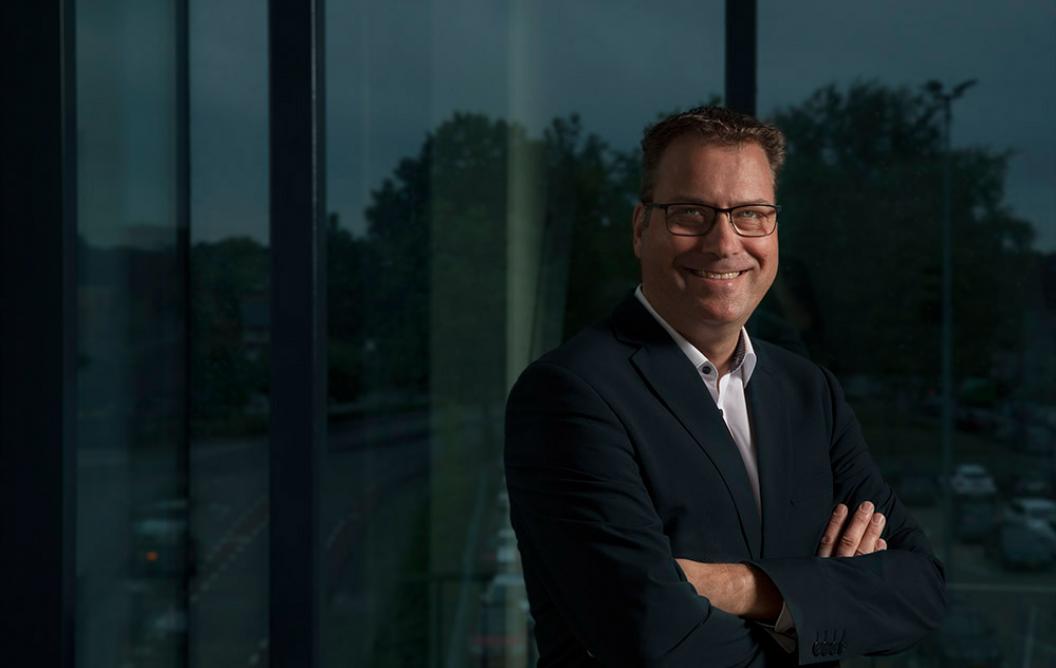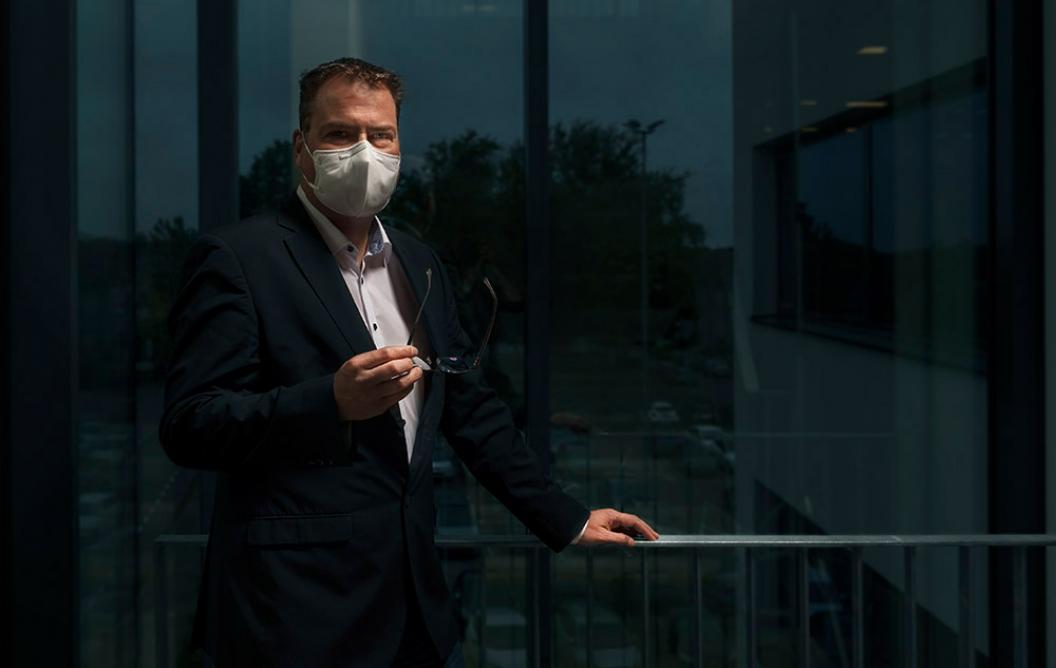“Why not move Carnival to summer?”
In 1988, Christian Hoebe made the conscious choice to study Medicine in Maastricht. He remains a staunch advocate of Problem-Based Learning. “You can still see me in one of the university’s first television ads, back when I was a medical student. I’ve got my arm draped around a skeleton and I’m inviting everyone to come to Maastricht,” he laughs. Now a professor of Social Medicine and head of Infectious Disease Control at the GGD Zuid-Limburg, Hoebe discusses his passion for social medicine, his childhood in Alkmaar and, of course, the fight against COVID-19.
As a student here, Christian Hoebe felt like a ‘fish in the Maas’. “My student days were fantastic. Being in Maastricht was like being on holiday every day.” Alongside his studies, he worked as a student assistant at the medical education office, was a member of the Faculty Council, and served on the board of the study associations Reflex and KoBeraad.
Born and raised in Alkmaar, Hoebe was what one might call ‘an accident’. His father was 24 and his mother just 22 when she fell pregnant. “My paternal grandparents lived in a big house. Downstairs they had had a dance school, and we were able to move in there. My sister was born two years later. My uncles and aunts were young at the time and still lived at home, so we were surrounded by family. As the first grandson, I was very welcome. Initially my grandparents helped to raise me. I have good memories of those years.”
His father, a workaholic, was a financial controller and an executive at a large mortgage bank. “I was 18 when he died in a car accident. It was during my last year of high school. It wasn’t easy, but I managed to finish the year. Then I was keen to go to university, even though it meant leaving my mother and sister behind with just the two of them.”
After a false start—electrical engineering in Delft and military service—he consciously opted for Medicine and PBL in Maastricht. “The distance was difficult for my mother, but I felt that life had to go on.” Because his father was often working, he has few memories of him. “And it was a long time ago. I get my interest in animals and plants from him, though. We had a big garden and he chose all the trees. I recognise something of myself in that. My hobby is mountain biking through hill country. That’s my backyard; it’s how I clear my head, and then I can tell you all about the birds and plants I come across.”
Solving puzzles
Hoebe opted to specialise in social medicine. The decision was prompted by his final medical internship, which he did at the GGD (the regional public health service). “I studied the side effects of malaria drugs. It was my first experience with infectious diseases, and I was immediately intrigued by the puzzles you have to solve during epidemics: who gets it, how does it spread? In those days, the medical curriculum didn’t pay much attention to infectious diseases. We all thought they were over. We figured we have vaccines, antibiotics, antivirals, so we don’t have to spend much time on them.”
That was in 1995. Hoebe was able to stay on at the GGD, and followed the Society and Health programme for doctors in Utrecht. One thing led to another. He wrote about practical cases, such as a hepatitis A epidemic at a primary school in Heerlen and related legionella deaths in a rehabilitation clinic, and that led to publications in good academic journals. “I enjoyed it so much that at some point I thought: surely I should be able to get a PhD. At the time, the GGDs had no culture of doing scientific research, let alone doctorates. I think I was one of the first in my study programme to have a PhD.” With a swag of articles under his arm, he went to Amsterdam and looked up Roel Coutinho, Jaap van Dissel’s predecessor at RIVM. Coutinho was impressed and agreed to serve as his supervisor. Six months later, Hoebe obtained his PhD on infectious diseases and outbreak management.
Detectives among the doctors
In early March, when the corona crisis broke out in the Netherlands, experts in social medicine turned out to be invaluable. But there are too few of them, Hoebe says. “I’d say there are no more than 150 doctors for infectious diseases, and they’re all at the RIVM or the GGD. The traditional medical world has not always taken social medicine seriously; being a specialist has more prestige and the pay is better. But we are the detectives among the doctors. This pandemic is a good wake-up call—perhaps now more junior doctors will choose it as a specialisation.”
He values the combination of academia and the practice of the GGD. “When I became a professor, it meant I was able to take a scientific approach to practical issues in society. As a result, the GGD and the university are taking steps that they couldn’t take independently. For example, we discovered that women with chlamydia are often infected not only vaginally but also anally. That requires a different treatment. So you had women thinking they were chlamydia free when they weren’t. Now, with corona, the collaboration between the GGD and the university also creates opportunities: in August we received a €1 million Interreg grant for a study on the occurrence of the coronavirus in South Limburg, Germany and Belgium, and the effect of the different measures. In the coming year we’ll be inviting 30,000 people to take part in the study in two rounds. We hope to have the preliminary results early next year. All those years of cooperation in the Euregion have laid a foundation that we can build on now.”
No shortage of tests and staff in Limburg
He is proud of his field and ‘his’ GGD, that much is clear. Under Hoebe’s leadership, the Sexual Health, Infectious Diseases and Environment department has grown from 40 to 70 employees. “Testing and source and contact tracing are two of the most important weapons we have in the fight against COVID-19. It’s a pity that not all GGDs have enough staff to meet the demand. Organisationally, we have our house in order. The track and trace policy is not at risk here, partly thanks to the short lines of communication between the GGD and UM: all tests are performed by the lab of the Microbiology department, where I’m based at the university hospital. Because we’ve been working together for years now, we can perform many tests very quickly. And like at Schiphol, we’ve set up a pilot to test international students from orange and red areas. Combating the corona pandemic is an immense task for the GGDs.”
Infections among students
Hoebe is of the opinion that UM has handled the crisis well. “It immediately put measures in place to prevent the spread of the virus, some of them almost too strict, if you ask me. Of course, reducing the number of people physically present in buildings helps, but for some staff and students, working or studying from home is unsustainable. So that remains a difficult decision. What’s really good is that there has been a lot of communication via updates, emails and so on.”
And yet, at the start of the academic year, dozens of students contracted Covid-19, mainly through private circles. What can UM do about this? “Additional testing and source and contact tracing was performed and a campaign was launched to raise students’ awareness of the importance of the measures. Beyond that, there’s not much more you can do than point out that they themselves can get very sick and infect others. The same holds for everyone: discipline and persistence. It’s not an appealing message, but we’re just the messenger—it’s the virus that kills us.”
The new normal
When does he think a vaccine will become available? And what will the world look like then? “I think some changes will be structural, such as more online meetings, because that saves a lot of commuting time. You can also question whether we should really keep celebrating Carnival at the start of spring, when there’s a higher risk of infectious diseases. That probably played a role in the spread of corona. I realise it’s almost blasphemous to say, but health-wise it would be better to do it in summer. And it might help to enforce the ban on shaking hands in healthcare, because it slows the spread of infections. But of course we wouldn’t want that in the private sphere. We’re social creatures; even I hate the 1.5 metre rule. You want to be able to give someone a hug, you want contact. Ultimately we’re just going to have to go back to that. It will probably be another year before a vaccine is available in the Netherlands. But even if it is, that won’t be the case everywhere in the world. We need a lot of patience. Therein lies my concern: do we have enough of it?”

